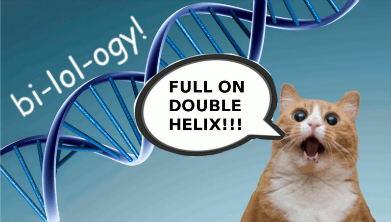"Hey RZINZ, do you know anything about vegan protein powder?"
I really didn't, but I looked around and found something interesting
Before I post it, I must also give the disclaimer that the site I took this from looks legit. That is, to someone without the proper resources, it looks like a trustworthy authority on healthy eating and living.
Unfortunately, what I found is that at least some of the content isn't just slightly misstated scare-mongering about "bad food", some of it is literally flat out wrong.
The quote below may only be one sentence long, but it carries a lot of meaning and some serious implications.
Here’s the deal: the protein isolates that are known carcinogens are soy protein isolatesWhoa there nelly hold the fucking phone.
This not only literally untrue, but also has the added benefit of making people think that soyfoods give you cancer. Which is also the exact fucking opposite.
Time to drop some motha-fuckin' science
Pollard and Wolter (2000), found that in a rat model system predisposed to spontaneous prostate adenocarcinomas, a diet in which soy protein isolate was the only source of protein had a significant protective effect against prostate cancer. That is, the rats fed on a diet containing only soy protein isolate developed less prostate cancer than rats fed the control diet.
So right now we see the exact opposite of the claim that soy protein isolates are "known carcinogens".
Hakkak et al (1999) found something even more interesting- rats fed a diet with soy protein not only developed normally (take that people who claim that soy is bad for developing infants) but also that the rats on the soy protein diets developed 20% less cancer when stimulated with 7,12-dimethylbenz(a)anthracene (which is actually a horrible carcinogen)
But wait, there's more!
There are at least two review studies and both of them found the same thing- not only was soy protein isolate not a carcinogen, but it generally had a protective effect against cancer.
Badger et al (2005) found this, which I will post in its entirety
Both epidemiological and animal studies suggest that consumption of soy protein is associated with lower incidence of breast, colon and prostate cancer. A limited number of studies have been conducted on mechanisms underlying these effects. It is clear that the gene expression profile of animals fed SPI differs substantially from that of control animals fed casein [12]. This is likely to occur in humans as well. We have shown that expression of proteins necessary to activate carcinogens can be suppressed by SPI and this is likely responsible, in part, for reduced mammary and colon cancer incidence.And finally, the coup de grace for this claim comes from Messina et al, (1994)
Of the 26 animal studies of experimental carcinogenesis in which diets containing soy or soybean isoflavones were employed, 17 (65%) reported protective effects. No studies reported soy intake increased tumor development.No studies reported soy intake increased tumor development
NO STUDIES
And that was published in 1994! They make the claim that
While a definitive statement that soy reduces cancer risk cannot be made at this time, there is sufficient evidence of a protective effect to warrant continued investigation.which, at this point we can upgrade to "soy reduces the risk of specific cancers".
Evidence-less scare mongering makes me upset, especially when the evidence we do have says the exact opposite thing.

No comments:
Post a Comment